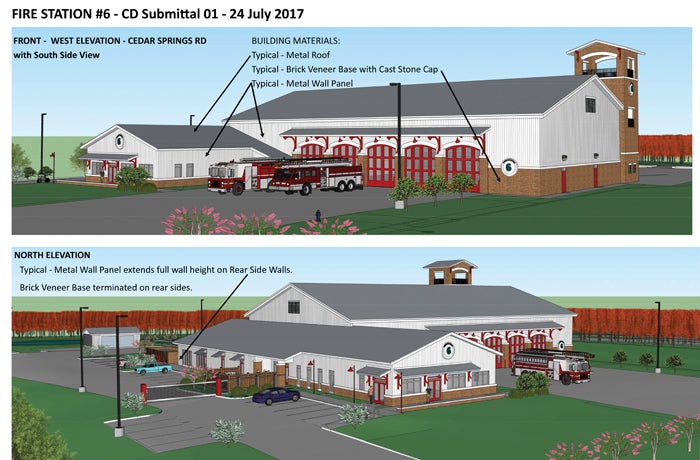Capital Improvement Plan shows city prioritizing downtown Salisbury
Published 12:00 am Tuesday, May 15, 2018

- Fire Station 6 is just one of the projects that has its funding laid out in the city's Capital Improvements Plan. (Courtesy of the City of Salisbury)
SALISBURY — The draft of the city’s Capital Improvement Plan — which looks at its finances 10 years into the future — shows a high priority for downtown investment, as well as street and public safety improvements.
The highest-cost item on the plan — which covers expenses between 2019 and 2028 — is a Main Street infrastructure project budgeted at $20 million.
The 10-year plan includes 41 items and totals $52,953,888.
City Finance Director Shannon Moore said all but three items — the Main Street infrastructure project and two new fire stations — will be funded through the operating budget.
She said the infrastructure project and the fire stations would be funded with debt packages.
According to a Capital Improvement Plan document, the Main Street infrastructure project would include wider sidewalks, additional lighting and spots for outdoor dining.
The document says the purpose of the project is to “provide traffic calming and improve pedestrian safety.”
It goes on to say that the infrastructure changes will “help elevate the downtown as a sought-after destination, boosting commerce and tourism.”
The $20 million would be spent in $5 million installments between 2021 and 2024.
The next most expensive item in the plan is road resurfacing, for which $6 million is budgeted.
Moore said the city hasn’t determined yet what roads would be repaved. If the budget item passes, Moore said, a street survey would be done to determine which roads are most in need.
The $6 million for the resurfacing would be paid in yearly $500,000 installments over the 10-year period, as well as for a year before and a year afterward.
During a City Council special meeting Wednesday, Public Services Assistant Director Craig Powers said the $500,000-a-year investment in road repaving would put the city on schedule to have all roads repaved every 50 years.
Powers said the standard is to repave roads every 20 to 25 years.
Other high-cost items in the plan are replacements of a heating-and-cooling system and a roof.
The allotted cost for the HVAC system is $1,352,500, and the cost for the roof is $3,072,000.
Moore said the city building to receive the replacements would be chosen in much the same way roads would be chosen for repaving.
She said that if the budget item passes, a consultant would evaluate the condition of city buildings like the Police Department, City Hall, and parks and recreation facilities.
About $9 million is allotted for construction of two fire stations — Fire Station 3 and Fire Station 6.
Fire Station 3 would cost $4 million; Fire Station 6 will cost $4.7 million.
The City Council voted in September to rezone land on Mahaley Avenue for a new Fire Station 3.
The current Fire Station 3 — built in 1956 on Innes Street — is the second-oldest fire station in Salisbury.
Fire Station 6 will be built primarily to serve residential parts of Salisbury that have been newly annexed, including the Weatherstone subdivision, and areas with light and heavy industrial activity.
The council voted in November to rezone 6 acres on Cedar Springs Road for Fire Station 6. The $4.7 million station would predominantly be paid for in 2019, with $250,000 being paid in 2018.
The $4 million for Fire Station 3 would predominantly be paid for in 2022, with $425,000 being paid in 2018.
The annual Downtown Revitalization Incentive (DRI) Grant program is budgeted for $1,869,558 over the 10-year period, with annual allotments of $150,000 available for downtown property owners to apply for.
Approximately $219,500 would go toward two projects in 2019, said City Planner Kyle Harris — the O.O. Rufty’s building renovation and the renovation of Center Court on South Main Street.
About $3 million is allotted for the extension of Newsome Road and construction of bike lanes and sidewalks on the road.
The extension — which would connect East Innes Street and Faith Road — is budgeted for $1.1 million, and the bike lane and sidewalk additions are budgeted for $1.634 million.
The city anticipates the cost of the Newsome Road extension will be reimbursed by the North Carolina Department of Transportation by 2020.
Moore said the city is not statutorily required by the state to have a Capital Improvement Plan. But she said it is “fiscally prudent” to have one for long-term planning.
Moore said the plan would not be “passed” by the City Council, like the city budget is. But she said that in the past, the council members have come to a consensus on whether the plan fits the vision they have for the city.
Contact reporter Jessica Coates at 704-797-4222.



